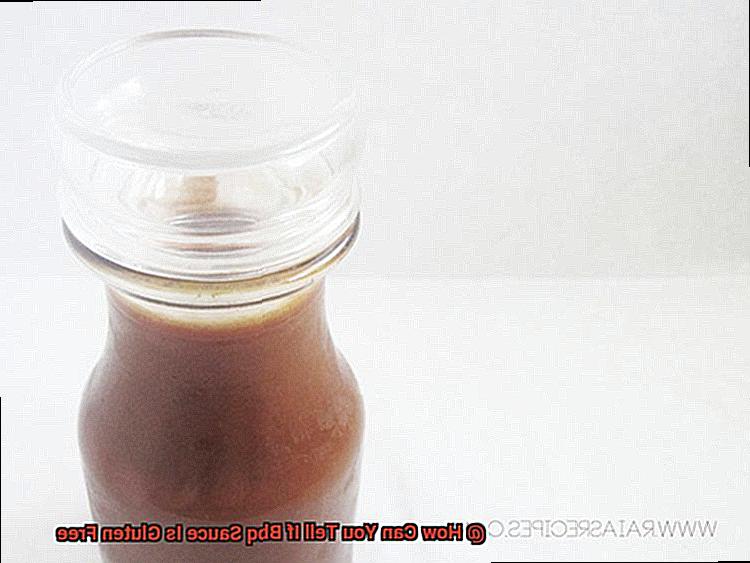Summer is here, and that means it’s time to break out the grill and get cooking up some mouthwatering BBQ. But for those with gluten sensitivities, finding a safe BBQ sauce can be a challenge. Many traditional BBQ sauces contain wheat-based thickeners like soy sauce, which can lead to gluten contamination. However, there are several foolproof ways to ensure your BBQ sauce is gluten-free.
First and foremost, scrutinize the ingredient list. Avoid any sauces that contain wheat, barley or rye in any form since these are all sources of gluten. Instead, opt for sauces that use cornstarch or other gluten-free thickeners.
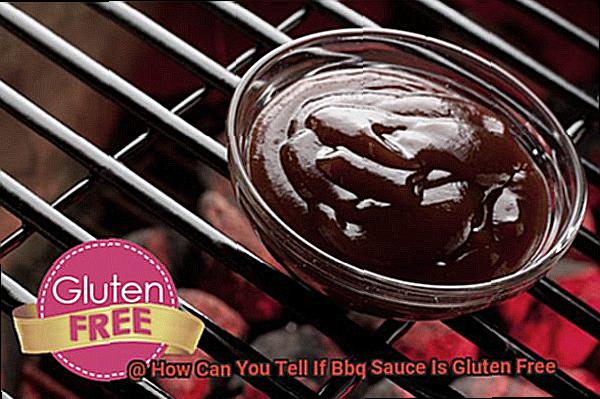
Secondly, keep an eye out for a certified gluten-free label on the bottle. These labels are awarded by third-party organizations that test the product for gluten content and guarantee it meets strict gluten-free standards.
If you’re still unsure about a particular BBQ sauce’s gluten content, don’t hesitate to contact the manufacturer directly. Most companies have customer service numbers or online forms where you can inquire about their products’ ingredients.
With these tips in mind, you can enjoy your summer grilling sessions without worrying about accidentally consuming gluten-laden sauces. So grab a bottle of certified gluten-free BBQ sauce and let the good times roll.
Contents
Checking the Ingredients of BBQ Sauce
If so, checking the ingredients of BBQ sauce is a crucial step to ensure that you can indulge in your favorite flavors safely. Gluten can be found in various ingredients, such as wheat, barley, and rye. Therefore, it’s essential to be thorough and vigilant when examining the label of any BBQ sauce you’re interested in using.
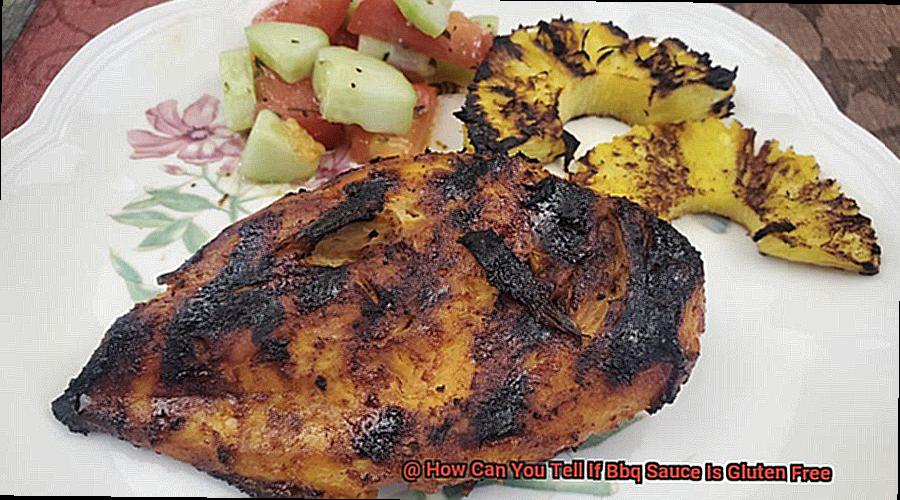
To start checking the ingredients of BBQ sauce, look for obvious sources of gluten, such as wheat flour, barley malt, and rye flour. If any of these ingredients are listed on the label, then the BBQ sauce is not gluten-free. However, gluten can also be hidden in other ingredients that may not be as obvious. For example, soy sauce often contains wheat as an ingredient, which means that any BBQ sauce containing soy sauce is not gluten-free. Therefore, it’s crucial to read the label carefully and look for any hidden sources of gluten.
Cross-contamination is another factor to keep in mind when checking the ingredients of BBQ sauce. Even if a BBQ sauce does not contain any gluten ingredients, it may still come into contact with gluten during the manufacturing process. The same equipment may be used for products containing gluten and those that are gluten-free. To avoid this risk, look for labels that specifically state the product was made in a gluten-free facility.
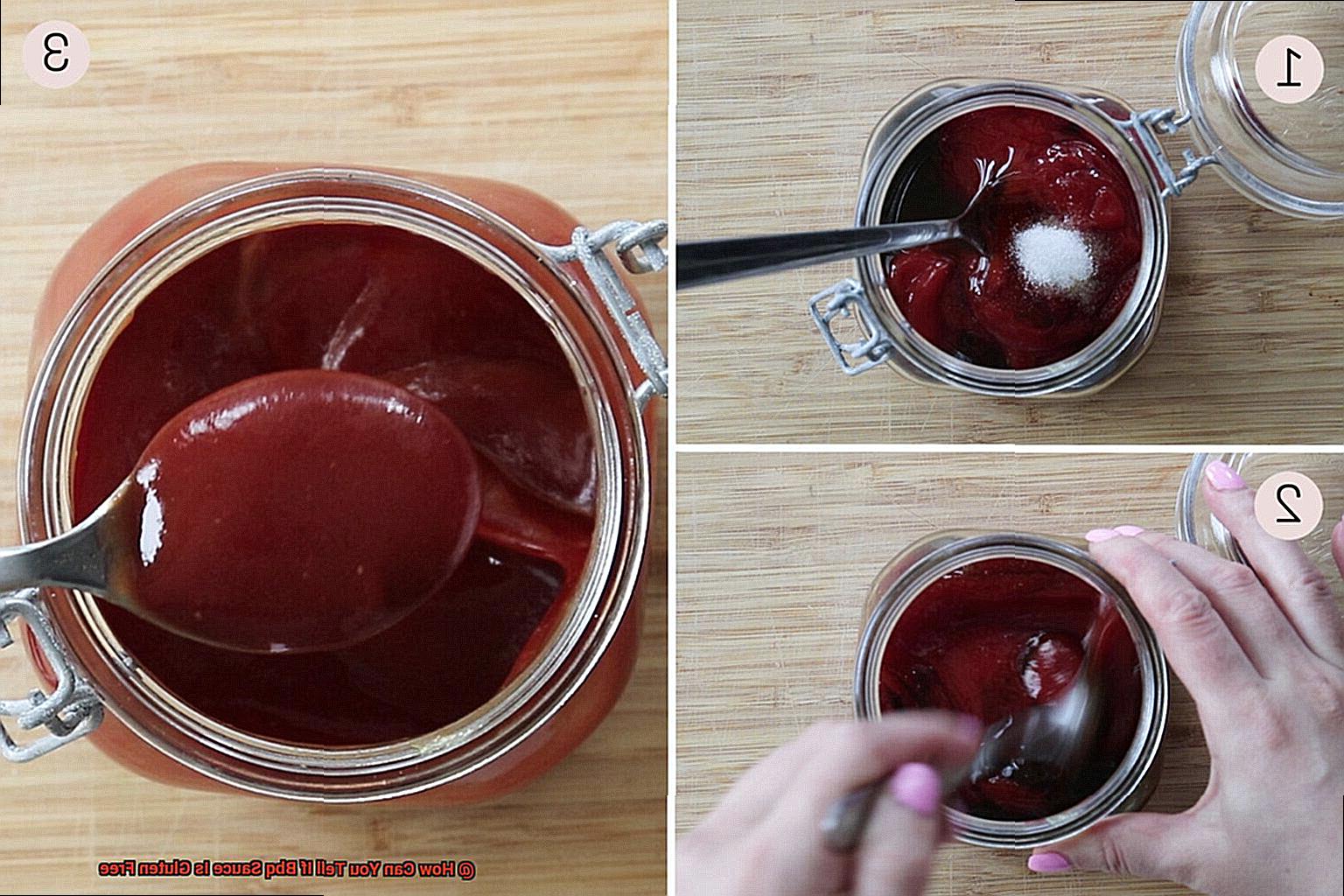
If you want to be extra cautious, seek out BBQ sauces that are certified gluten-free by reputable organizations like the Gluten-Free Certification Organization (GFCO). These sauces have been tested and verified to contain less than 20 parts per million of gluten, which is considered safe for those with celiac disease or gluten sensitivity.
Cross-Contamination and Gluten-Free Facilities
You know how crucial it is to find a sauce that is genuinely gluten-free. However, have you ever considered the risk of cross-contamination in your search for the perfect BBQ sauce?
Cross-contamination refers to the unintentional transfer of gluten from one food item to another, which can occur during manufacturing or preparation. Even tiny traces of gluten can cause significant issues for those with celiac disease or gluten sensitivity, making it essential to ensure that the BBQ sauce you choose is entirely free from any form of cross-contamination.
The first step in avoiding cross-contamination is to look for a certified gluten-free label on the bottle or packaging. This label confirms that the product has undergone rigorous testing and verification processes to guarantee that it contains less than 20 ppm of gluten, which is considered safe for those with celiac disease.
However, even if a BBQ sauce is labeled as gluten-free, there is still a risk of cross-contamination during the manufacturing process if the facility also produces products containing gluten. To mitigate this risk, some manufacturers have dedicated gluten-free areas or follow strict protocols to prevent cross-contamination.
To ensure that your BBQ sauce is produced in a safe environment, consider reaching out to the manufacturer directly. They may have production process information available on their website or packaging, or you can ask for more details about their protocols through customer service.
It’s also essential to note that cross-contamination can occur during storage and preparation. To avoid this, always use separate utensils and surfaces when preparing food for those with celiac disease or gluten sensitivity.
Reading Labels Carefully
Many BBQ sauces contain ingredients that can potentially contain gluten, such as wheat flour or malt vinegar, and even the smallest amount can trigger adverse reactions.
When perusing the label of a BBQ sauce, here are some essential sub-topics to keep in mind:
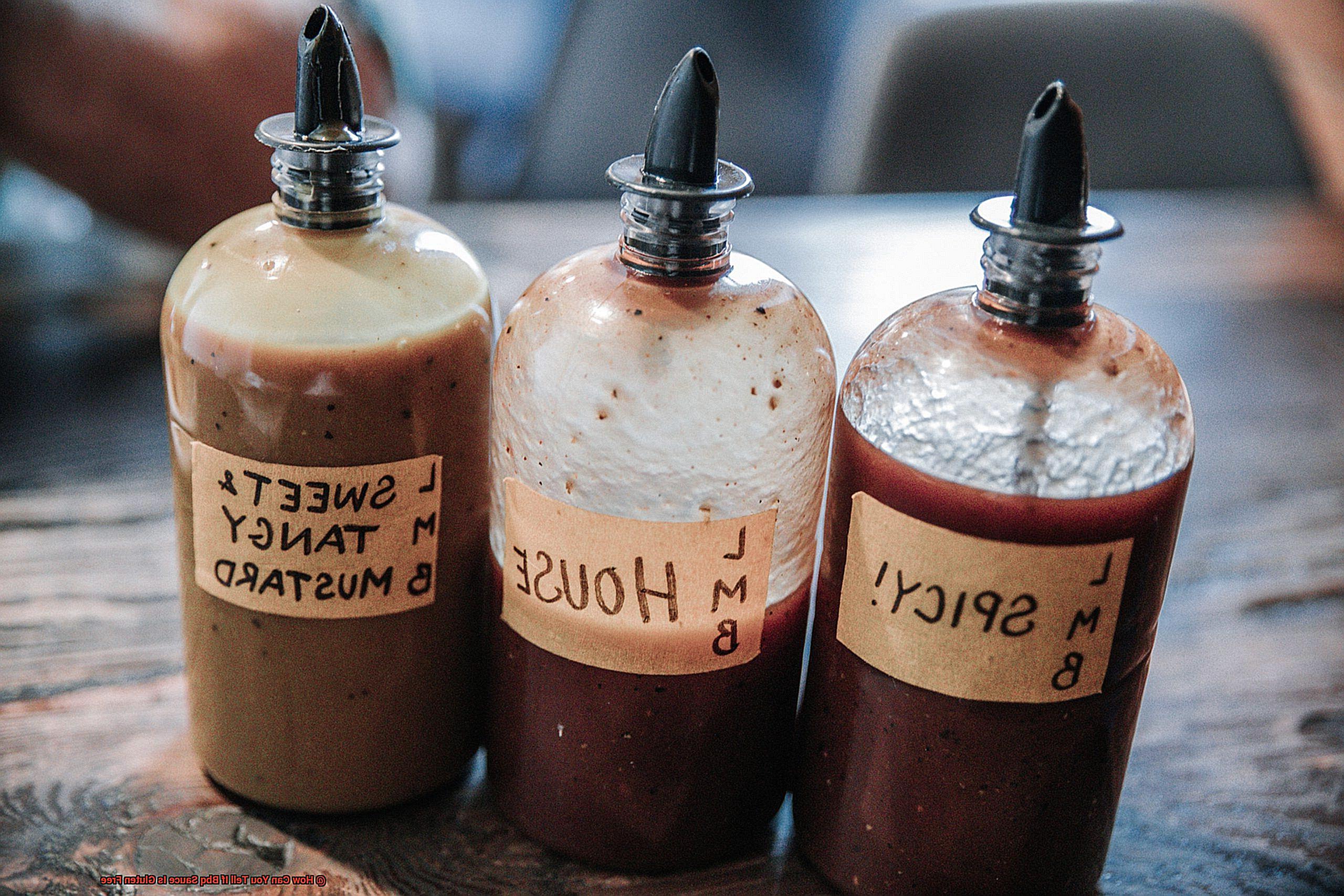
- Gluten-Containing Ingredients: Some ingredients explicitly mention gluten, such as wheat, barley, or rye. These are glaring red flags for anyone searching for a gluten-free option. Therefore, it’s crucial to scan the ingredient list carefully and identify any such ingredients.
- Ambiguous Terms: Some ingredients might not explicitly mention gluten but may still contain it. For instance, vague or ambiguous terms such as “natural flavors” or “spices” could potentially contain gluten. In such cases, it’s imperative to seek more information by doing some research or reaching out to the manufacturer for clarification.
- Cross-Contamination: Even if a BBQ sauce doesn’t contain any gluten-containing ingredients, cross-contamination can occur during production, storage, and transportation. This could result in tiny traces of gluten in the final product. To ensure that a BBQ sauce meets strict gluten-free standards, look for labels that specifically state “gluten-free.”
Common Gluten-Containing Ingredients to Look Out For
For those following a gluten-free diet, finding safe BBQ sauce can be challenging. But fear not, by knowing the common gluten-containing ingredients to look out for, you can ensure that your summer grilling is both delicious and safe.
Gluten is a protein found in wheat, barley, and rye, and can take many different forms in food products. Soy sauce is one such example that is often used in BBQ sauce but typically contains wheat. Instead, choose gluten-free soy sauce or tamari as an alternative.
Worcestershire sauce is another savory ingredient to be cautious of as it often contains malt vinegar made from barley. But don’t worry, gluten-free options are available, just check the label.
Modified food starch may also be used as a thickener in BBQ sauce and can be derived from wheat. So, it’s best to look for corn or potato starch instead. Additionally, hydrolyzed vegetable protein (HVP) is commonly used as a flavor enhancer in sauces and can also be derived from wheat. Double-check the label for gluten-free options.
Lastly, avoid barley malt which is often used as a sweetener in BBQ sauce. By recognizing these common gluten-containing ingredients, you’ll be able to determine if your BBQ sauce is safe to consume on a gluten-free diet.
It’s important to note that even if a product doesn’t contain any of these ingredients, cross-contamination may still occur during processing if it’s in the same facility as wheat products. Always read labels carefully and don’t hesitate to contact the manufacturer with any questions or concerns.
Contacting the Manufacturer for More Information
Looking for gluten-free BBQ sauce options can be daunting, but one of the best ways to ensure safety is to get in touch with the manufacturer directly. While some manufacturers may label their products as gluten-free, others may not. In these cases, reaching out to them personally can provide a clearer picture of whether or not a particular BBQ sauce meets your dietary needs. As an expert on this topic, I’m here to offer some valuable tips on how to go about contacting the manufacturer for more information.
First things first, locate the contact information of the manufacturer. You can usually find it on the product packaging or on their website. Once you have this information, you can reach out to them via phone or email and inquire about the gluten-free status of their BBQ sauce.
When contacting the manufacturer, it’s crucial to ask specific questions about their ingredients and manufacturing processes. Here are some questions that can help you get started:
- Does the sauce contain any gluten-containing ingredients?
- Is the sauce produced in a facility that also processes gluten-containing products?
- Do you test your products for gluten? If so, what testing methods do you use?
- Have you undergone any certifications or third-party testing to verify your product as gluten-free?
Asking these questions will give you an informed decision about whether or not a particular BBQ sauce is safe for consumption. Don’t hesitate to follow up if you need clarification or more information.
It’s also a good idea to ask about any certifications or third-party testing that the manufacturer has undergone to verify their product’s gluten-free status. This can provide an added level of assurance that the product is safe for those with celiac disease or gluten sensitivities.
Different Brands with Gluten-Free Options
There are plenty of brands out there that offer gluten-free options to satisfy your cravings.
One of the most popular brands is Sweet Baby Ray’s, which offers a wide range of gluten-free options, including their Original, Hickory and Brown Sugar, and Honey BBQ sauces. Stubbs is another well-known brand that provides a variety of gluten-free options like their Original, Sweet Heat, and Spicy BBQ sauces.
If you prefer organic products, Primal Kitchen has got you covered with their Classic and Golden BBQ sauces, which are not only gluten-free but also paleo-friendly, made with high-quality ingredients. And if you crave a little heat in your sauce, Stubbs offers gluten-free options such as their Sweet Heat and Spicy BBQ sauces.
Annie’s Naturals is another notable brand that offers a Sweet and Spicy BBQ sauce made with organic ingredients and no artificial colors or preservatives. Lastly, the trusted name in condiments, Heinz, also has a gluten-free BBQ Sauce option that is made with real cane sugar and natural ingredients.
However, it’s essential to check the ingredient label for any potential cross-contamination with gluten-containing ingredients during the manufacturing process. In addition to this, it’s always wise to confirm with the manufacturer if you have any concerns or questions about their products’ gluten content.
Preparing Your Own BBQ Sauce at Home
Look no further than your own kitchen. Preparing your own BBQ sauce at home not only ensures that it’s gluten-free, but also allows you to customize your sauce to your taste preferences.
The first step is to start with a base of tomato sauce or ketchup, which are typically gluten-free. From there, you can get creative and add in your desired seasonings like garlic powder, onion powder, paprika, and cumin. If you prefer a sweeter BBQ sauce, consider adding honey or brown sugar (just make sure they are also gluten-free).
But watch out for Worcestershire sauce. It’s a common ingredient in many BBQ sauces and often contains gluten. Luckily, there are gluten-free options like Lea and Perrins Gluten-Free Worcestershire Sauce available on the market.
Another ingredient to be cautious of is soy sauce – it’s often made with wheat and can contain gluten. Switch to a gluten-free soy sauce or tamari to ensure your BBQ sauce is safe and delicious.
By creating your own gluten-free BBQ sauce at home, you have complete control over the ingredients and can easily avoid cross-contamination. Plus, it’s a fun and easy way to impress your guests at your next cookout.
To sum it up, here’s a quick checklist for making your own gluten-free BBQ sauce:
- Start with a base of tomato sauce or ketchup
- Add in your desired seasonings and spices
- Sweeten with honey or brown sugar (if desired)
- Use gluten-free Worcestershire sauce
- Choose a gluten-free soy sauce or tamari
Tips for Finding a Delicious Gluten-Free BBQ Sauce
With a little bit of effort and label reading, you can find a sauce that meets your dietary needs and satisfies your taste buds. Here are five tips to help you find the perfect gluten-free BBQ sauce:
Check the Label Carefully
The first and most crucial step in finding a gluten-free BBQ sauce is to check the label carefully. Look for any mention of gluten-containing ingredients such as wheat, barley, or rye. Also, be wary of hidden sources of gluten like soy sauce or malt vinegar. It’s vital to check every ingredient to ensure that the sauce is safe for those with celiac disease or gluten intolerance.
Certified Gluten-Free Sauces
Another tip is to look for sauces that are certified gluten-free by a reputable organization. These sauces have been rigorously tested and verified to contain no trace of gluten, making them a safe option for those with gluten sensitivities or celiac disease.
Avoid Gluten-Containing Ingredients
Some BBQ sauces may contain thickeners like wheat flour, which can be harmful to those with gluten sensitivities. Instead, look for sauces that use alternative ingredients like cornstarch or rice flour as thickeners.
Read Reviews from Other Gluten-Free Consumers
Research different brands and read reviews from other gluten-free consumers. This can give you an idea of which brands and flavors are delicious and reliable, helping you make an informed decision.
Experiment with Making Your Own Sauce
Finally, don’t be afraid to experiment with making your own gluten-free BBQ sauce at home. This allows you to control the ingredients and tailor the sauce to your personal preferences. Many recipes available online use alternative thickeners and flavorful ingredients like honey or molasses.
YE7LieGygGI” >
Conclusion
Are you a BBQ lover with gluten sensitivities? Finding a safe and delicious gluten-free BBQ sauce can be a daunting task, but it’s not impossible. By following these tips, you can enjoy your summer grilling sessions without any worries.
The first step is to carefully scrutinize the ingredient list. Avoid any sauces that contain wheat, barley or rye in any form. Instead, opt for sauces that use cornstarch or other gluten-free thickeners. Keep an eye out for certified gluten-free labels on the bottle as these are awarded by third-party organizations that test the product for gluten content and guarantee it meets strict gluten-free standards.
Cross-contamination is another factor to consider when checking the ingredients of BBQ sauce. Even if a sauce doesn’t contain any gluten ingredients, it may still come into contact with gluten during the manufacturing process. To avoid this risk, look for labels that specifically state the product was made in a gluten-free facility.
Don’t hesitate to contact the manufacturer directly if you have any concerns or questions about their products’ gluten content. There are also many brands out there that offer safe and delicious gluten-free options like Sweet Baby Ray’s, Stubbs, Primal Kitchen, Annie’s Naturals, and Heinz.
If you’re feeling adventurous and want complete control over your ingredients, consider making your own BBQ sauce at home using a base of tomato sauce or ketchup and adding in your desired seasonings and spices.
With these tips in mind, you can indulge in mouthwatering BBQ without worrying about accidentally consuming gluten-laden sauces.

